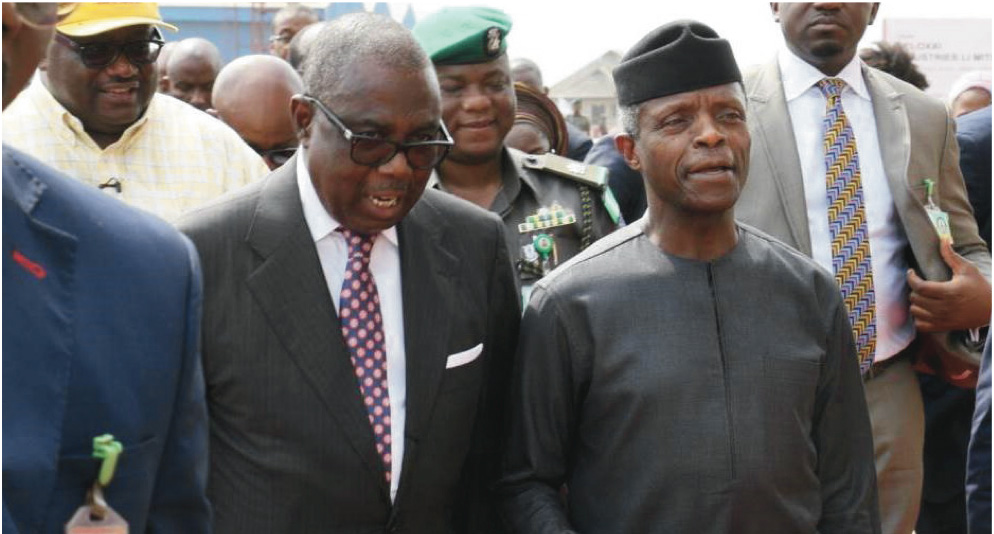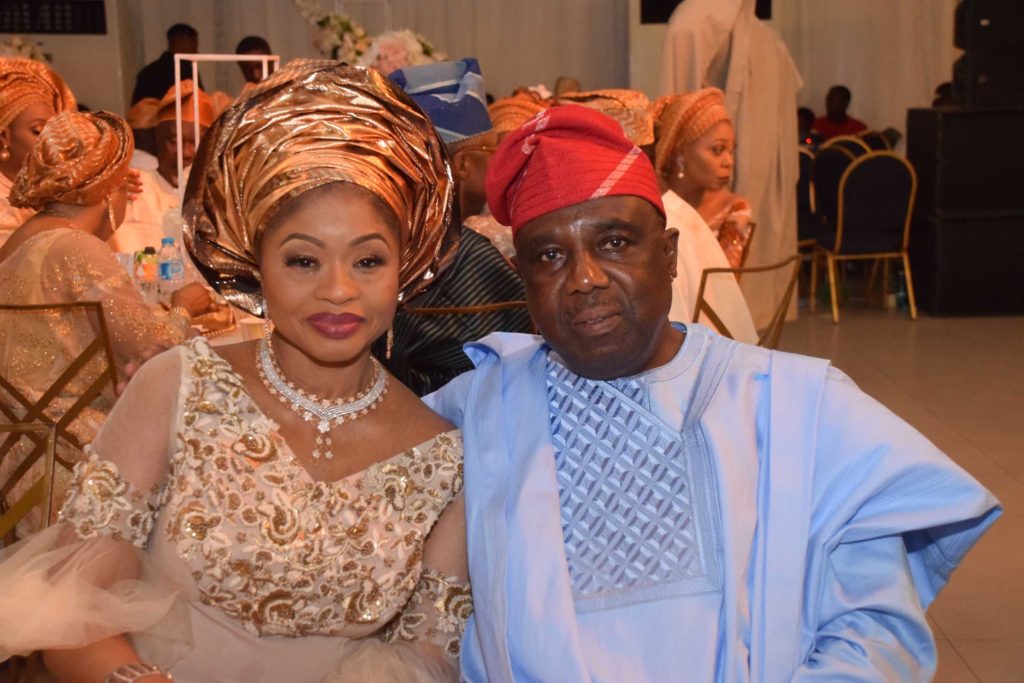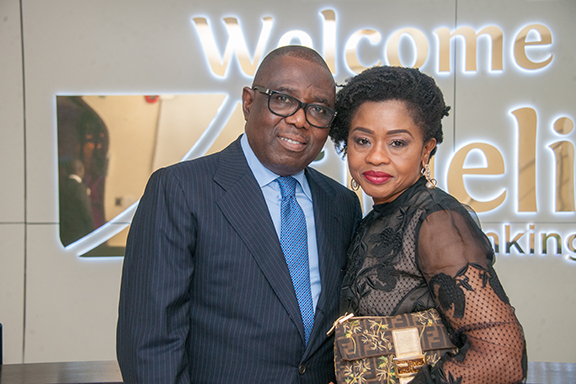Fidelity Bank’s Chairman, Ernest Ebi turned 70 this week. We pay a tribute to Boardroom Guru, Consummate ProfessionalWe have re-published a 2018 interview with him. It is a handbook for success you young professionals. And aspiring corporate leaders. Enjoy.
This interview was first published in Fidelity Bank’s TrueServer Magazine Volume 2. Issue 2. 2018.

Mr. Ernest Ebi is one of the most respected bankers of this generation. Since quitting active banking, he has become a most sought after business leader, applying his wealth of experience in steering the Boards of various companies, from banking to manufacturing. In this interview with FTM, we took the Board Chairman of Fidelity Bank to task on a number of issues ranging from banking reforms, capacity building and online banking. Enjoy!
Most Nigerians have short-term views of issues but contrary to this approach to life, you seem to have been more comfortable taking the long-term view. Why?
I know that this is supposed to be the “Jet Age” but one must learn to walk before running. I am a marathoner so I understand the importance of having a long-term focus, knowing when to slow down and when to gather pace. Anytime I get an opportunity to speak to young people, I tell them the importance of delayed gratification, using my own experience.
The bedrock of my position today are the times in the past where I sacrificed a higher pay for competence and knowledge. This is the secret of my staying power and capacity to add value in complex or difficult decision making scenarios.
Today a lot of people are in a hurry – they want to keep up with the joneses, forgetting that Rome was not built in a day. They are not grounded but seek positions and levels for which they do not have capacity or experience. Promoting people beyond their competence is the reason for the ineptitude that we see in a lot of institutions today.
My advice to young professionals is this – hone your skills, get experience, build capacity – If your organization does not reward you, the market will. In the process of time, you will get there. Don’t be in a hurry.
You have seen action in the regulatory side of the financial services industry and you have also seen action as a banking operator. What unique experiences have these two sides given you?
I have been privileged to see the different facets of banking in this country. As an operator, I worked in several departments (including Treasury, Credit & Marketing, Liability management and internal audit & Control) in different DMBs → (Deposit Money Banks).My greatest challenge was when I was given the mandate to turn around the distressed New Nigerian Bank as its Managing Director. However, the task was made easier by the number of years that I spent building capacity.
The decent turnaround job that we did in the aforementioned bank attracted the attention of the regulators and I was given the opportunity to serve as a Deputy Governor in the CBN.
My time as a regulator was a significant experience altogether; three of us were appointed from the private sector to work in the apex bank and we approached our assignment with a private sector mindset. This was how the transformation journey in the Central Bank began in 1999.

*****
Today a lot of people are in a hurry; they want to keep up with the joneses, forgetting that Rome was not built in a day. They are not grounded but seek positions and levels for which they do not have capacity or experience.
*****
The experiences from the various assignments and jobs I did, gave me a world-view, capacity and confidence to be successful.
What has been your most significant challenge in the industry?
Over the years, I have learnt to put God first in everything that I do – That is why I have the capacity to remain calm in the midst of the storms, sometimes to the astonishment of my colleagues. I have spent four decades in the banking industry, naturally there have been ups and downs but my toughest assignment was the New Nigerian Bank turnaround mission.
In my professional life, I always crave for a work place where I can lead and apply my core values. I strive to lead by example. I wear my core values like a garment. It is what has brought me thus far in my career and I cannot change.
While in International Merchant Bank (IMB), I was appointed an Executive Director, Corporate Banking in African Continental Bank (ACB). My first reaction was to reject the appointment I felt I would not have enough influence to implement the reforms that I thought were necessary to revive the institution. However, Chief Paul Ogwuma, former Chairman of ACB, and the then Governor of the CBN persuaded me to take the job.
ACB was pretty tough. My initial fear was confirmed – I could not implement the reforms that I thought were necessary because the buck did not stop at my table. So I went to God in prayers
for a better placement. In March 1995, the NDIC / CBN Board re-shuffled the leadership of the banks that were under NDIC/CBN management and
I was appointed the Managing Director of New Nigerian Bank. I was a bit apprehensive when I first heard the news because of the intricacies surrounding the position but as I was lamenting at home, my daughter reminded me of my prayers during the ACB era. She said that I should look on the bright side. I “caught” that statement and decided to make the most of the opportunity given to me. On resumption of duty, I was inundated with all kinds of petition against the past management but I knew that if I had to investigate all the allegations of wrong doing, it would be difficult to make progress so I pressed forward with the implementation of the reforms that the bank so badly needed.

At my first meeting, I shared my vision with my Management team and assured them that at the board level they won’t be hearing anything about the past, rather, we would direct all our energy towards the assignment before us. We focused on debt recovery and deposit mobilization. We refused to compromise on ethical standards and led by example. Amazingly, in two years, things started turning around, our performance was noticed by all and the accolades began to pour in. I recall getting a call one day from one of the Deputy Governors at CBN commending us for the impressive performance.
Eventually we became the beautiful bride and there was overwhelming interest from potential investors to buy the bank.
One thing I omitted earlier was that at the beginning of my assignment, I introduced a weekly fellowship. Every Thursday evening, we met in the boardroom to pray to God to deliver the bank. There was a plaque in the boardroom that says, “With Jesus in the boat, we shall not sink”. That became our anthem, – it indeed inspired us.
The three years I spent in New Nigeria Bank (NNB) were the most difficult and challenging times in my career. It was the Grace of God that sustained me. Sometimes, I was tempted to quit. But I persevered and ensured we rescued the bank. Eventually the bank attracted a lot of potential investors and was acquired in 1999.
That was my New Nigerian Bank story. The assignment lasted three years but the experience would stay with me for a lifetime. It certainly helped shape my career thereafter.
In all your experiences, from the time you had to transform a bank to the time you were in at the CBN when you look at the financial system in Nigeria, when would you say has been a defining moment?
It is pertinent to note that I have both merchant banking and commercial banking experience. As you are aware, merchant banking is wholesale banking whilst commercial banking is retail. As a merchant bank you don’t have the advantage of having ‘free floats’ as every penny in your vault is purchased funds. Also, merchant banks are required to open clearing accounts with commercial banks. This gave the commercial banks competitive advantage over the merchant banks. In fact, this was what informed the Central Bank’s decision among other things to introduce Universal banking in 2000 / 2001, thereby providing a level playing field. However, after the 2008/2009 banking crisis, the CBN observed that some banks abused the opportunity provided by universal banking to delve into all kinds of financial engineering for which they had no skills or experience. This was attributed to one of the major causes of the distress in the banking sector. Consequently, the CBN reverted to banking industry segmentation of Merchant Banking, International and Regional Banking etc. with different capital requirements for each.
What also contributed to the policy change was the transformation of the Nigerian economy which offered opportunity for investment banking products like M & A, bond issuance, financial advisory services etc. This opportunity also attracted several international banks into the Nigerian banking space.
I believe that there are enough investment banking products today to sustain merchant banking, however, Merchant Banks need to develop the requisite skills and discipline required for investment banking to compete effectively with the international banks.
Everybody now talks about online banking and all kinds of technological products. From your experience, is that going to really drive the kind of banking system we require to take us to the proverbial next level?
The truth is that you cannot run away from digitization. It has come to stay. We must embrace it and strategically position ourselves to benefit from it. As a leader, I believe in value innovation.
It is what drives a business to have a worldview of your industry and position your business to take advantage of emerging opportunities. You are proactive rather than reactive. Digital transformation has created an entirely new experience for banks and their customers. It will definitely take banking to the “proverbial next level” but it is important to stress that digital transformation will require collaboration between banks and Fintechs.
Is this collaboration likely to push into the rural areas, because some people say there is a problem of financial inclusiveness?
Financial inclusion is the collective responsibility of players in the banking industry. However the government also has an important role to play given that education levels, infrastructure and other structural challenges are impediments to the success of the program. There is need for massive sensitization and education of the masses to increase the level of financial inclusiveness in the country.
People of your experience are required to provide a body of knowledge on a sustained basis to improve the quality of human capacity in the banking sector. The quality of human capacity seems to be thinning out. What is your take on this?
I agree with you that quality of human capacity in the sector need to be urgently addressed. You will recall that there were only a few banks in Nigeria early in the 1980s and the banking skill set was adequate. However, the industry growth in terms
of brick and mortar spread was faster than the available skill set. The situation is reminiscence of what happens in the urban centers where people build houses without waiting for infrastructures to be put in place only for the government to demolish those buildings to make way for infrastructures! This is putting the cart before the horse.
Banks were licensed without taking into consideration the availability of skilled personnel required to drive them profitably hence they ended up promoting people beyond their competence level.
Let me use myself as an example. In our own time, before you resume at the bank, you go on a long usually 6 months to one year training. Some of us had the privilege of going abroad for such trainings. Banks that were affiliated to foreign banks send their staff to those banks to train and work there for a while to acquire the necessary experience and skills before returning to Nigeria.
At IMB, we were affiliated to First Chicago. We trained for 6 months with First Chicago. During that time you do class work and you do practical work to internalize what you have learnt. You come back home to Nigeria; you are well prepared and equipped for the job.
Now, to the issue of competition in hiring personnel and poaching; we see a staff who has just been promoted as Assistant General Manager (AGM) in a bank, being offered the position of a Deputy General Manager (DGM) in another bank with little or no work experience at that level. As a result, there are a lot of people in the industry with big titles but little or no experience.
I always say you don’t need a title to be a leader. You can lead from whatever responsibility you are assigned. That was what made me stay in IMB for 13 years. I was approached to head two banks at the time, but I felt I was not ready. As a result, I stayed until I felt adequately prepared to venture out.
We need to get back to training people. Let us establish academies, let banks form affiliations. Train and retrain your people. See training as an investment. The concern about training people who will then leave to other banks can be resolved through proper consultation and collaboration.
A strategy could be for the banking watchdog to give a directive of “cooling off period”- meaning, if you leave a bank, you cannot work in another bank for two years. Who will want to be without a job for two years? So, you may be compelled to stay there and be well grounded. I think these are some of the reforms I would love to see in the banking industry, so that the industry would regain its lost glory.

If you were not a banker, what would you have been and why?
I would have been a teacher. I like interacting with people and affecting lives positively. It gives me joy. When I was leaving the CBN my next destination was teaching and I was scheduled to take a teaching job at a University in Boston
I thought I would have left the CBN in 2008 but the then Governor, Mr. Soludo asked me stay one more year. When I did finally retire in June 2009, all hell had broken loose. The global financial crisis was in full swing and with the global economy in turmoil, I could not see myself moving to America. I decided to stay back and then I started getting invitations to join the Boards of several companies.
I currently lecture at the Institute of Directors (IoD). It gives me a platform to express myself and share my experiences with others and contribute my own quota to developing Nigeria’s future leaders.

How do you spend your spare time?
I have a very good social life. I still play squash every Saturday at Ikoyi Club. I have a vibrant group of friends and we all play together. God’s grace upon my life is massive. At my age, I do not have any knee problems. I still play squash but not with the intensity of a young man. During my time at CBN, I played golf in Abuja. I am one of those who took golf in school as an elective. I know textbook golf. I do my work out with my trainer at home on Monday, Wednesday and Friday. I watch the English premiership. I am an Arsenal.


Tell us about Mrs. Ebi?
My wife is a gem. If I had to marry again, I will marry her over and over. She is exactly what I desire in a woman. We have been together for over 44 years. I met her in 1972, I was just 22 years old and I called her my wife. It just came out and eventually she became my wife. We’ve had a very great relationship. She is indeed the bone of my bone and the flesh of my flesh. We have a near perfect marriage. We’ve not been apart for a single day.
She is a very strong professional. She is a guru in the financial space. She is a friend, wife and partner. We have three lovely children who are disciplined. I am so proud of my children.

